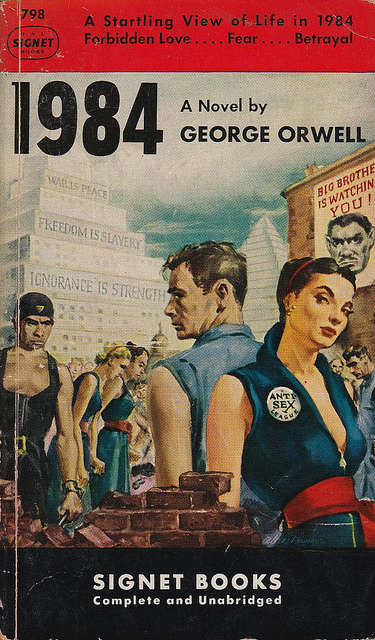
Editor’s note: The below represents some speculation. But these are good and vital issues to consider.
Read about other scary aspects of Facebook in parts one, two, and three.
~
Only a few decades ago, “Big Brother’s watching you” was still science fiction.
The book Nineteen Eighty-Four was, even in the early 80s, just an unsettling story that we didn’t expect to become reality. Now, in close conjunction with our smartphones, Facebook has far surpassed Orwell’s “Big Brother” in the way it gathers information about us.
Facebook knows everything about us.
E-v-e-r-y-t-h-i-n-g.
And all that information gets monetised through the ads on our newsfeeds. Through our behaviour on Facebook, they learn a lot about us, mostly by our own free choice:
Our profile.
At first, all they wanted to know was our name, age, and gender. But over time, Facebook has expanded the profile form considerably. Sweetly suggesting that they want to improve our Facebook experience, or help us find more friends, in fact they just want to know more about us. In what they call the “Intro,” they ask not only about our location, work, relationship, family, and education, but also about hobbies, favourite foods, our life motto, and what makes us happy.
It’s all on file.
Our likes, comments, and shares.
These tell Facebook in detail what we like, whom we like, when we like, and how often we like. Through our clicking behaviour, they know everything about our preferences regarding people and all sorts of topics, including music, fashion, politics, lifestyle, and activities, to name a few. They also learn whether we’re happy, sad, or mad about something. It all gets fed into the algorithms.
Our posts: status updates, photos, shared links, and milestone events.
It’s the same story as our likes.
Nowadays, you can add in detail how you feel, or what you’re doing, thinking, or eating, with a cute little symbol. This, again, seems like a sweet and gentle gesture by Facebook, allowing us to share with our friends in a personal way. It would not surprise me if our expressed feelings go straight into Facebook’s database.
Our personal messages.
Oh yes, they get scanned too! Have you ever seen the planner pop up when you mention “Friday” or “tomorrow” in a message? Once, I messaged with a friend about a topic that was unusual for me. The next thing I know, an ad pops up in my newsfeed exactly about that topic. Your messages might be private in the way that other friends cannot read them, but Facebook sure does!
Facebook cleverly blinds us by allowing us the option to set our account up for privacy, so that the whole world can’t see what we share with our friends, and by offering private messages. They will even warn us gently if our settings are on “public” and someone who is not our friend has liked one of our posts, feigning a concern for our privacy. But it’s a false sense of privacy, since they sell our information to their advertisers.
Their questionnaires.
Again, in a helpful tone offering to improve our experience, Facebook regularly asks us in detail what we like. “Improving our experience” is a euphemism for labelling and boxing us, ready to be sold to advertisers. Our information does get stored.
Fair enough—they offer us a free service of worldwide connection. But this service comes with a price tag. We choose by free will to use their platform, and in return, they get to use the information we leave behind. After all, we don’t have to use Facebook, do we?
As they say in marketing: when you don’t pay for the product, you are the product.
Up to here, I was only talking about our activity on Facebook. But it goes much further.
Facebook also tracks everything we do off of its own platform. Our browsing history in Google makes its way into their records. From puppies, politics, porn, or posh penthouses to pruning, pet peeves, pimples, or perfect parfaits, Facebook will know if we’re interested in them.
What topics we search, which sites we look at, how often we return there, how much time we spend on those sites, what we buy—the giant Cookie Monster, Facebook, gobbles up all that information.
Everywhere you see a “Like” button on the internet (which is on almost every website, these days), Facebook is watching you.
Not only does Facebook keep track of our browsing activity, it keeps track of our personal lives through our phones.
Of course, we’ve allowed it ourselves, since we agreed that the app could have access to every detail in our phone when we installed it. But did you ever read that fine print, or did you just blindly click “accept” to get the app going? That list in itself scares the sh*t out of me, and nowadays, it seems that all apps have it.
I won’t go into all the details, but here’s a few things that Facebook has access to on our phones:
“Allows the app to read all SMS messages, regardless of content or confidentiality.”
Sweet! I don’t need to have a nosy partner, roommate, or younger sibling in the house to have someone sneakily reading my private stuff; Facebook is on it!
“Allows the app to use the camera at any time without your confirmation.”
Whoa, better keep my phone out of my bedroom! (Recently a friend of mine freaked out when Facebook had compiled a “highlights” collage with photos from her phone that she hadn’t shared yet.)
“Allows the app to record audio at any time without your confirmation.”
I have stopped singing in the shower for good.
“Allows the app to modify the data about your contacts, including the frequency with which you’ve called, emailed, or communicated in other ways with specific contacts, and delete contact data.”
Why, I ask, does Facebook need to know how often I call my mom or text a friend or lover? Sounds fishy to me. I start wondering who else has a stake in this app, other than the obvious advertisers.
Then this one:
“Add or modify calendar events and send email to guests without owner’s knowledge. App may share your calendar data, regardless of confidentiality or sensitivity.”
Yup. Facebook can change my plans for me.
I bet Orwell would have loved to write a sequel to Nineteen Eighty-Four based on this information.
So, let’s recap: Facebook knows everything about us.
Oh, and then there’s this: “It’s also information that governments or divorce lawyers could come and ask for really at any moment.”
According to Christopher Soghoian, principal technologist at the American Civil Liberties Union, Facebook is at least honest enough to give yearly disclosure about all the requests for information that they receive. “[…]what is clear from these transparency reports is that governments in the U.S. and elsewhere have an enormous appetite for data.”
With two billion people using Facebook worldwide, happily volunteering all their private information, I would say that Mark Zuckerberg is probably the most powerful man on our planet, especially since he got us all more or less addicted to his product.
If this does not faze you at all, congratulations, you will sleep peacefully tonight.
For those of us who are feeling slightly concerned by now, there are a few things we can do to be more mindful about the way we use the internet in general and Facebook in particular:
Don’t follow up on all of Facebook’s sweet offers to “improve our Facebook experience.”
We should be more mindful of the fact that all these “improvements” are ways of getting more information about us. Don’t volunteer all that personal information! If we just want to have some fun, and are okay with a few white lies, we can even fill these questionnaires out with random fake information, shaking up the algorithm a bit by confusing them about our preferences.
Choose carefully what we click on.
Whether it is the like or share button, or a video or article that we want to see, we should be aware that our click will register this preference of ours in the Facebook algorithm and thus becomes a piece of information to be monetised.
Clear our browsing histories regularly.
We can clear our caches (the “cookies” that track our activity) both in and outside of Facebook to minimise the amount of information we’re providing.
Change our ad preferences.
If we really don’t want to see all those obnoxious ads, we can go to the Facebook.com/help page, choose the tab “Managing Your Account,” and click on “Ad Preferences” in the drop-down menu. It’s a bit of work, but you can change your settings to a mostly ad-free newsfeed. (Funny that they never suggest that when offering to improve our Facebook experience.)
We can also use separate browsers for online purchases or specific browsing topics if we don’t want Facebook to get a firm grip on our consumption patterns or quirky habits. Apparently, logging out of Facebook doesn’t really make a difference if we’re still using the same browser. Facebook never sleeps.
Turn off that phone!
Like, off-off, not just putting it in sleep mode.
Ditch Facebook.
But this would be our least preferred option, wouldn’t it?
The difference between us and the people in Nineteen Eighty-Four is that we happily agree to give away all this information. I can think of two reasons for that: we are addicted to social media, the self-exposure-culture, and our phones, and the fact that all that information is not (yet?) used to oppress us on a big scale.
In the final episode of this Facebook horror-series, I will talk about the positive sides of this scary monster—because every dark cloud has a silver lining too.
~
Relephant Bonus: Spotlight Interview
~
Author: Leontien Reedijk
Image: Chris Protopapas/Flickr; Jay Wennington/Unsplash
Editor: Catherine Monkman
Copy Editor: Travis May
Social Editor: Waylon Lewis







Read 2 comments and reply